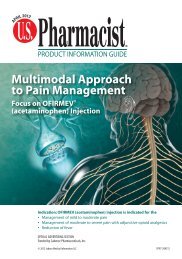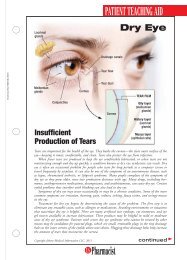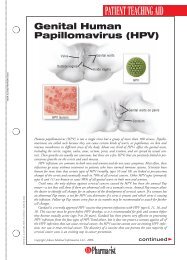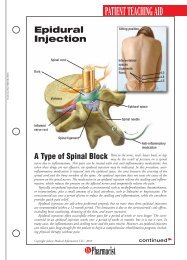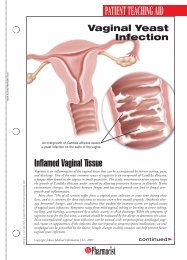View PDF Edition - U.S. Pharmacist
View PDF Edition - U.S. Pharmacist
View PDF Edition - U.S. Pharmacist
Create successful ePaper yourself
Turn your PDF publications into a flip-book with our unique Google optimized e-Paper software.
HEALTH SYSTEMS EDITIONMTOR INHIBITORS FOR METASTATIC RENAL CELL CARCINOMAFigure 1. mTOR signaling pathway.mTOR: mammalian target of rapamycin; PI3K:phosphoinositide 3-kinase.multiple kinases, including VEGFR 1–3, PDGFR-alphaand -beta, c-kit, Flt3, colony-stimulating factor receptortype 1, and RET. 4,6Bevacizumab is a monoclonal recombinant humanizedantibody that binds to and neutralizes circulating VEGFligand, which prevents activation of the kinase VEGFR. 2It was FDA-approved in July 2009 in combination withIFN-A for patients with metastatic RCC. Clinical trialsalso demonstrate activity as single-agent therapy. 4Mammalian Target of Rapamycin (mTOR) PathwayThree primary signaling pathways associated with RTKsare currently identified in cancer cells. One of them isthe phosphoinositide 3-kinase (PI3K)/Akt/mTOR proteincascade (FIGURE 1); the other two are the protein kinaseC family and the Ras/mitogen-activated protein kinasecascades. Activation of RTK leads to stepwise activationof PI3K, then Akt, and then mTOR, directly promotingtumor growth. The mutation and overexpression of RTK,as well as growth receptors, are common in RCC. 7Table 1Predictors of Short SurvivalRisk FactorsLDH levelHBCorrected serum calcium levelInterval from original diagnosisto start of systemic treatmentKarnofsky performance scoreNumber of metastatic sitesDescription>1.5 × ULN10 mg/dL





